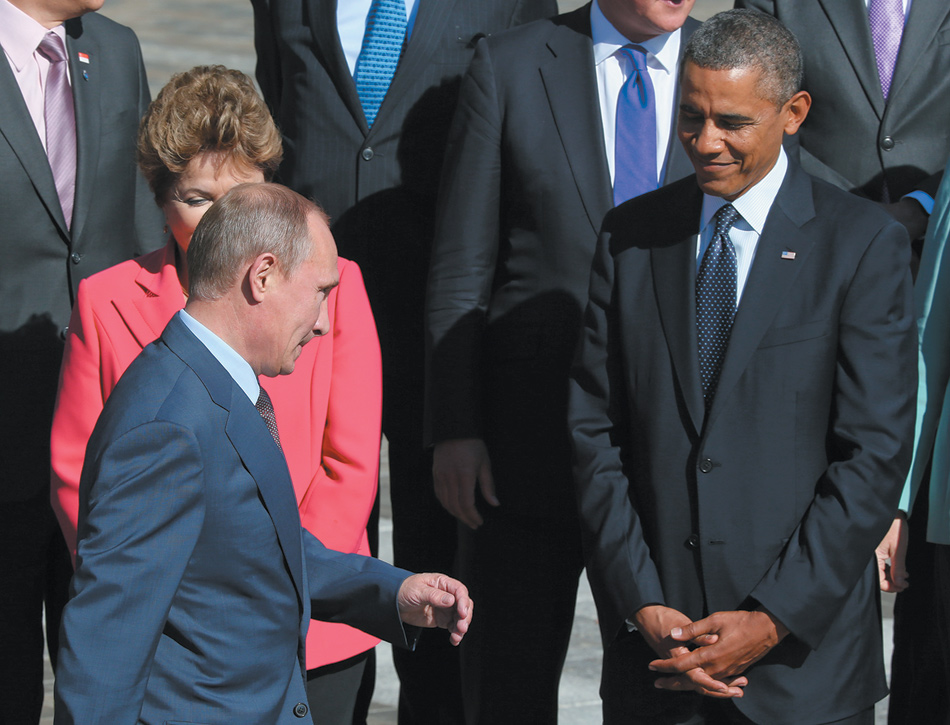In mid-September, a chorus of critics called President Barack Obama weak, indecisive, rudderless, and even a threat to the presidency for not ordering an immediate military strike on Syria. By seeking congressional approval for a strike, they claimed, he risked a debilitating political defeat at home. And now, by allowing the UN a chance to dismantle Syria’s chemical weapons program, he has given a victory to Russian President Vladimir Putin and Syrian President Bashar al-Assad. He should have just launched the missiles. That’s what a real American president would have done.
These claims are made not only by such persistent Obama naysayers as Michael Gerson and Charles Krauthammer. Obama’s own former defense secretary, Robert Gates, while opposing a strike as too risky, argued that going to Congress was a mistake. If Congress had said no to Obama, he maintained, “It would weaken him. It would weaken our country. It would weaken us in the eyes of our allies, as well as our adversaries around the world.”
In fact, what Obama did was adhere to the Constitution—and by doing so, he has now opened the way for a much better resolution of the issue. The Constitution’s framers gave the power to declare war and authorize other hostile military action to Congress rather than to the president precisely because they knew that legislators would be less prone to go to war. George Mason, one of the framers, explained that he was against giving the president the power to go to war without Congress because he “was for clogging rather than facilitating war; but for facilitating peace.”
In this instance, going to Congress did clog war. The Senate Foreign Relations Committee took up the matter, and approved a resolution permitting military force, but authorization would have required separate debates and votes in both houses of Congress. In the breathing space created by this process, a possible diplomatic solution was forged. A proposal by Russia to bring Syria’s chemical weapons under international control—prompted by John Kerry’s reply to a reporter who’d asked if there was anything the Syrian regime could do to avert a strike—has now led to an agreement between Russia and the US to identify and eliminate the weapons without military force. That agreement in turn has led to an effort to secure a UN Security Council resolution aimed at ensuring Syria’s compliance. Meanwhile, as an initial step, the Syrian regime has agreed to bring its chemical weapons program under the Chemical Weapons Convention.
Had Obama acted alone, he would have violated both the US Constitution, which requires prior congressional approval for a military intervention, and international law, which forbids the offensive use of force without Security Council approval. Instead, he is now pursuing a path that accords with the rule of law, and may in fact be more effective at deterring further use of chemical weapons. Indeed, it may even prepare the way for a diplomatic strategy to end the underlying civil war.
The deliberation prompted by Obama’s appeal to Congress created the space for an alternative to force—precisely what the Constitution’s framers intended. While the Constitution makes the president commander-in-chief, it also makes clear that he can initiate hostile military actions only once they are authorized by Congress. The only exception to this requirement is when military action is necessary for the nation’s self-defense, and no one has suggested that a strike on the Syrian regime can be construed as an act of self-defense.
It’s true that other presidents have ignored the constitutional requirement to go to Congress. But in most instances, they argued that their actions fell within the “self-defense” exception, and did not assert the power to launch an offensive war unilaterally. In any event, past presidential violations of the Constitution hardly justify unconstitutional action today.
Obama’s decision to go to Congress reaffirms that the people’s representatives should have a say on the difficult issue of whether to use military force against another sovereign state. (The administration covered its bases on the constitutional question by asserting that the president did not have to go to Congress, but it never made a plausible defense of that position, and it is inconceivable that, having sought Congress’s approval, he would have acted against its express wishes.)
Some say that had Congress said no, which appeared increasingly likely, it would have been a death blow to the credibility of the Obama administration—and gravely undermined the presidency itself. Others have argued that such an outcome would ensure that no future president would seek congressional authorization for acts of war. But such claims reflect a deep misunderstanding of the constitutional principle at stake. If the only time presidents should seek congressional authorization is when they are sure they will get it, the Constitution’s war powers clause would be a toothless check. And given the very serious questions the proposed military strike raised—whether it was lawful under international law without Security Council approval, whether it would do more harm than good, whether it might have played into Assad’s hands—this was precisely the kind of decision that warranted careful collective deliberation.
Advertisement
No one doubts that locating and eliminating Assad’s chemical weapons will be a daunting task. And in view of Russia’s dismissal of the UN report on the Damascus attacks and its continued obstruction at the Security Council, arriving at an effective UN resolution will be difficult. But without Russia’s participation, would it even have been possible to start these efforts? One thing seems virtually certain: having gone along with this agreement—and having admitted for the first time to having a chemical weapons program—Assad cannot again use chemical weapons against his people without risking large-scale retaliation. Thus, the ultimate objective here—to deter another chemical weapons attack—has arguably already been achieved.
Michael Ignatieff has persuasively argued that we should not abandon the “responsibility to protect” as a justification for intervention when a state subjects its own civilians to crimes against humanity. But as he notes, force is justified for that reason only when “peaceful means have been exhausted,…the force applied is strictly to protect human beings,…it will do more good than harm, and…it stands a reasonable chance of protecting civilians from further threats.”* The pause created by Obama’s decision to seek congressional authorization demonstrated, at least for now, that all peaceful means had not been exhausted. Thus, even under the disputed “responsibility to protect” doctrine, a military strike in this circumstance would not have been warranted.
What if President Obama had not gone to Congress, and instead acted unilaterally on his initial inclination to use force? The bombs would by now have been launched. Countless more civilians might well be dead. Russia would not have had time to make its diplomatic offer and might have dug in its support for Assad further, making peace negotiations all the more unlikely. Assad might well have felt a need to use the weapons again just to show that he was not cowed by the United States. It’s possible, of course, that the missiles would have inflicted severe damage on the Syrian regime and its ability to launch further attacks. But that seems unlikely, in view of both the president’s own assertion that such attacks would be limited and not aimed at decisively changing the conflict, and the virtual certainty that we do not actually know where all the weapons are.
Instead, we are on a path toward a diplomatic approach, one that, while entailing risks of its own, has succeeded in getting Assad to admit that he has chemical weapons and to agree to join the Chemical Weapons Convention. Whether or not this approach could also make headway in the formidable task of launching a negotiating process between the various rebel factions and the Assad regime and its allies is an open question, and the prospect of some kind of cease-fire is still remote. But the diplomacy now underway is far more likely to deter any future chemical weapons attacks than a missile strike would have been, and may lead to the destruction of a significant cache of chemical weapons. Avoiding immediate recourse to military action should be seen not as an embarrassment for the administration, but as a triumph for the Constitution—made possible by President Obama’s brave decision to go to the people’s representatives even when he could not be sure they would give him what he wanted.
-
*
“How to Save the Syrians,” NYRblog, September 13, 2013. ↩




